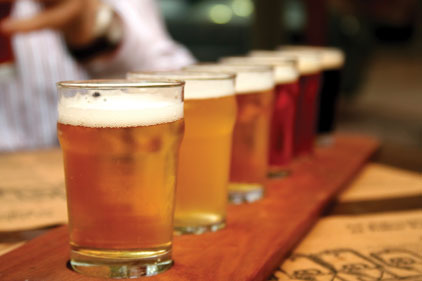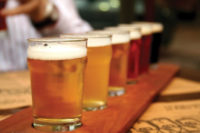Suit to Avoid Anheuser-Busch InBev, Grupo Modelo Merger

The surprise lawsuit seeks to block Bud Light maker Anheuser-Busch InBev NV's deal with the Mexican company that owns the Corona brand, and comes just a day after concession talks with the government broke down.
U.S. authorities said they want to prevent any overcharging by the global giants that dominate mass-market brews.
Defenders of the companies said U.S. consumers have plenty of choice. Belgium-based AB InBev said the government's action was "inconsistent with the law, the facts and the reality of the marketplace."
Beer specialists were divided on whether the merger could survive, with some speculating that AB InBev could relinquish further control over Corona sales in the U.S. to assuage concerns about pricing dominance.
The U.S. beer industry is largely controlled by two big players: AB InBev, owner of Bud Light and Budweiser, and MillerCoors, maker of the Coors Light brand. Modelo, whose Corona is the best-selling imported beer in the U.S., runs a distant third, with 7% of U.S. beer sales, according to the Justice Department. Together, AB InBev and Modelo would control about 46% of U.S. sales.
The Justice Department's 27-page lawsuit, filed in a Washington, D.C., federal court, portrayed Modelo as an important competitor that puts pressure on AB InBev to maintain or lower prices, especially in California, New York, Texas and some other markets. AB InBev has complained in internal strategy documents about pressure from Modelo's pricing tactics, the department said.
The department said that when AB InBev raises beer prices, MillerCoors usually follows followed suit, while Modelo has been resistant. AB InBev internal documents "show that it is increasingly worried about the threat of high-end brands, such as Modelo's, constraining its ability to increase…pricing," the lawsuit said.
The lawsuit sets the stage for a major court fight unless the sides can find a way to resolve their differences. "We intend to vigorously contest the DOJ's action in federal court," AB InBev said. Grupo Modelo issued a comment echoing AB InBev.
Should the acquisition agreement fall apart as a result of the antitrust challenge, AB InBev may have to pay Modelo a $650 million breakup fee, according to the agreement struck in June.
Some industry watchers scoffed at the U.S. government's logic, saying supermarket shoppers and bar hoppers can choose from a wide variety of beers. "Are you going to tell me because they increase the price of Corona there aren't other beers you can buy as a substitute?" said Jeffrey Golman, vice chairman of Mesirow Financial and head of investment banking at the Chicago bank. "It seems like an overreach."
However, Stephen Axinn, an antitrust lawyer with Axinn Veltrop & Harkrider LLP, said the government made a strong initial showing.
"The fact is you may have 50 different brands of beer on the shelf, but they're only coming from a few sources," Axinn said. He said that for AB InBev to win the case, it would have to demonstrate that the deal isn't likely to give it enhanced pricing power. Given the internal company documents cited by the Justice Department, "that might be a difficult thing to do," he said.
AB InBev made the deal for Grupo Modelo last summer, hoping to augment its position in the fast-growing Mexican market while expanding the reach of Modelo brands globally. AB InBev already owns a 50% economic stake in Modelo but controls fewer than half of the voting shares. It proposed to get full control by buying the rest of Modelo from the Mexican families that control it.
The companies had hopes for approvals because the Justice Department gave its blessing to two large beer deals in 2008. It allowed the combinations of Anheuser-Busch and InBev, maker of Stella Artois and Beck's, after finding the two companies engaged in little head-to-head competition in the U.S. The department also cleared a joint venture that combined the U.S. operations of SABMiller and Molson Coors Brewing Co.
Looking for a reprint of this article?
From high-res PDFs to custom plaques, order your copy today!




